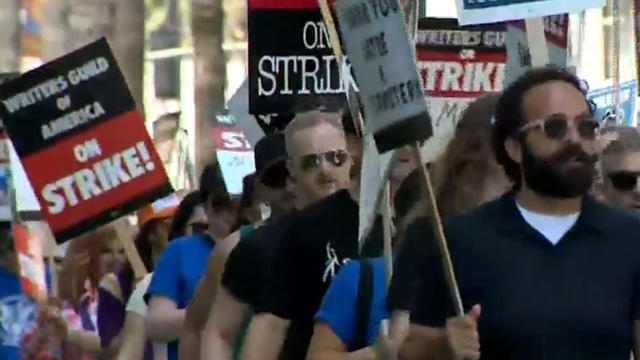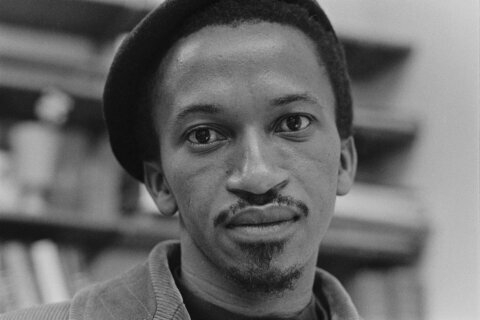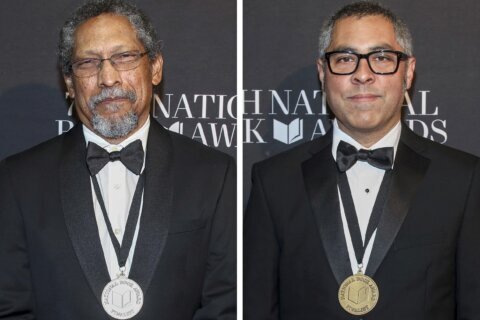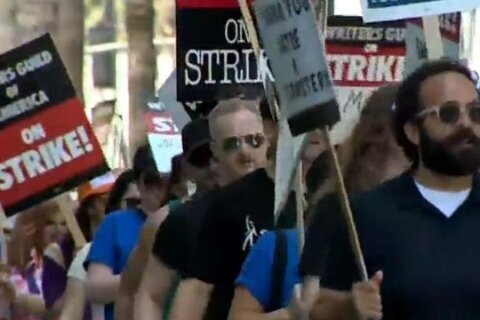
▶ Watch Video: With contract deadline looming, Hollywood actors could strike if no deal reached
Los Angeles — Major Hollywood stars have been giving a big boost this week to writers on the picket lines.
“Your fight is our fight,” acting legend Jane Fonda declared during a rally outside Netflix headquarters in Los Angeles Thursday.
While the Writers Guild of America strike is about to enter its third month, Fonda and fellow members of SAG-AFTRA — the union which represents thousands of actors in film and television — could soon join them, a move which would likely lead to a shut down of nearly all Hollywood productions.
SAG-AFTRA has about 160,000 members, while the WGA has approximately 11,000.
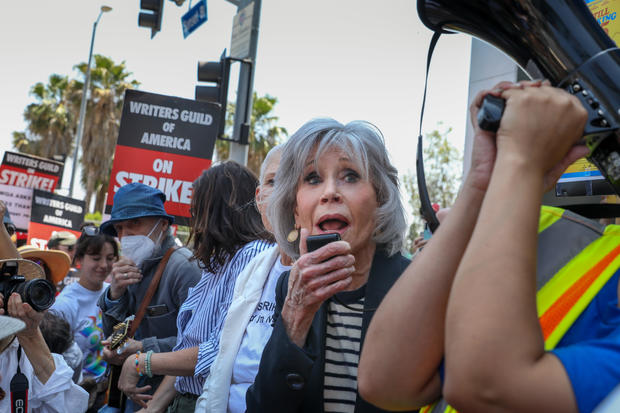 Actress Jane Fonda speaks during a “Striking 9 to 5” picket line in front of Netflix headquarters in Los Angeles, California, on June 29, 2023.
Actress Jane Fonda speaks during a “Striking 9 to 5” picket line in front of Netflix headquarters in Los Angeles, California, on June 29, 2023.
Jay L. Clendenin / Los Angeles Times via Getty Images
SAG-AFTRA’s current contract was set to expire at midnight Friday. However, on Friday night, SAG-AFTRA and the Alliance of Motion Picture and Television Producers, the group which represents the major studios, agreed to extend their contract through to midnight on July 12 in order to continue their talks.
“The parties will continue to negotiate under a mutually agreed upon media blackout,” the two sides said in a joint statement.
Earlier this month, SAG-AFTRA’s members voted overwhelmingly to authorize a potential strike in the event a deal isn’t reached with major studios.
“This is a huge deal right now for Hollywood, with again, far-reaching implications,” said Paul Dergarabedian, a senior media analyst for Comscore, told CBS News prior to the extension.
If it were to happen, it would mark the first Screen Actors Guild strike since 2000, and the first time that both the WGA and the Screen Actors Guild have been on strike simultaneously since 1960. The Screen Actors Guild and the American Federation of Television and Radio Artists merged in 2012.
Both unions are separately negotiating with the AMPTP, which represents Warner Bros. Discovery, NBC Universal, Sony, Netflix, and CBS News’ parent company Paramount.
A major sticking point in negotiations has been streaming. Hollywood unions allege that major platforms are raking in billions in revenue, while actors and writers are being paid a lower rate and have seen their residuals dry up.
“In the past, the monies that were earned by actors and writers were pretty direct and robust and was equitable,” Dergarabedian said. “But now with streaming, it’s a different model. And I think everyone’s scrambling to deal with these new financial and technological advancements.”
The use of artificial intelligence is another major issue, with many in the entertainment industry viewing it as an existential threat to their livelihoods.
“I think because of the fact that its advanced so rapidly, because it seems to have such a potential to change how this industry works and what the roles of key creative people in the industry are,” Dergarabedian said.
Duncan Crabtree-Ireland, SAG-AFTRA’s chief negotiator, echoed those concerns in an interview with CBS News last week.
“This potential to use that technology to create performances that never existed, or even to create performers that never existed, and that’s that’s something that that could be a real threat,” Crabtree-Ireland said.
Hundreds of actors, including the likes of Jennifer Lawrence, Quinta Brunson and Rami Malek signed a letter earlier this week urging SAG-AFTRA leadership “to make clear our resolve” that “we are prepared to strike if it comes to that.”
In a video message to members last week, SAG-AFTRA President Fran Drescher said that negotiations have been “extremely productive” and “we’re going to achieve a seminal deal.”
“I think the whole industry is on pins and needles right now,” Dergarabedian said. “But we’ll just have to wait and see.”

